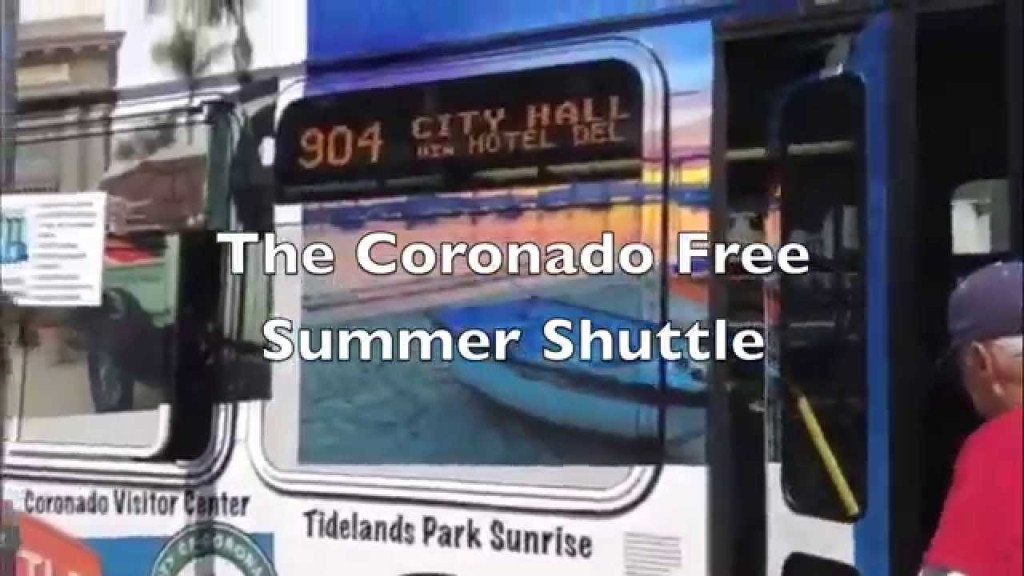 By all accounts, Coronado’s free summer shuttle was a rousing success. Ridership was up and, when asked, most said they would like to see the service extended year round. This summer, some 116,499 hopped aboard, up 48% percent from last year and 110% over 2013.
By all accounts, Coronado’s free summer shuttle was a rousing success. Ridership was up and, when asked, most said they would like to see the service extended year round. This summer, some 116,499 hopped aboard, up 48% percent from last year and 110% over 2013.
Not only was ridership up, comments from passengers were overwhelming positive. A few people were even willing to pay to ride, if the price were reasonable. One survey respondent suggested a dollar.
Others suggested amenities to make the ride even sweeter – music, food and beverage – along with improved air-conditioning, new seats and more frequent service.
Besides being a crowd-pleaser, the shuttle eliminated an estimated 34,000 cars from Coronado streets during the summer of 2015, based on a volunteer on-board survey conducted by city staff. The survey asked passengers how they would have made the trip if a free shuttle didn’t exist. Of the 240 people who responded, 46% said they would have walked, 30% would have driven, and 11% would have biked.
These figures coincide with results from a Transit Cooperative Research Program Report, cited in the staff report, that said that about one-third to one-half of bus riders see driving as the mass transit alternative.
This year’s summer shuttle cost $95,200 in fees paid to the MTS.
Hoping to build on this success, Councilwoman Carrie Downey suggested the city offer the free shuttle service all year long.
Research shows extending the service year round would increase ridership from 25% to 50%. It would also reduce traffic, parking woes, and drunk driving. Perhaps equally importantly, it would provide affordable transportation to service employees and seniors on a fixed income.
These benefits came with an estimated $190,000 price tag. The council cut the cost by taking a cautious, more incremental approach to building on the free shuttle by increasing frequency to 15 minutes from 20 minutes (for $120,000) and the summer dates by 30 days ($160,000).
Coronado could also buy a few buses and set up its own shuttle service. Buses cost anywhere from $300,000 to $520,000 each. The staff recommends purchasing at least three and one spare. Then there is maintenance, insurance, and depreciation, not to mention driver’s salaries and benefits, to consider as well.
Whether the service is operated by the city or the MTS, there is interest in improving service to Cays and enhancing transportation options for Navy commuters.
One idea is to a “transit circulator bus” between the ferry landing, the main gates at Naval Air Station and Naval Amphibious Base. Talks between the city and the Navy are underway and a report should reach the city council this coming spring.
To improve service to the Cays, staff recommended a loop between the parking lot at the Cays Park by the Fire Station and the southern in end of the village, allowing residents to leave their cars at the park and transfer to the Summer Shuttle at the southern end of the Village.
Besides voting on if and how to enhance mass transit on the island, the city council will also consider a number of other key issues, including awarding a contract and approving funds for the Wayfinding program, voting on commission appointments for the Bicycle Advisory Committee (BAC) and the Successor Agency to the Community Development Agency.
Making it easier for visitors to find their way around Coronado has been long deferred goal. The concept was included in the Orange Avenue Corridor Specific Plan that was adopted in 2003 to guide policymakers on development and design in the city’s business district.
Wayfinding signage will cost approximately $280,000 and will consist primarily of a kiosk with a city map and safe travel routes to popular destinations at the Ferry Landing pier. A second kiosk had been suggested for First Street as well as a sign behind the community sign on Third Street. Neither was recommend. The staff considered the first too expensive and the latter unnecessary. A similar sign along Third Street, just east of the intersection will provide the same information.
A number of commission appointments have come up over the last few months, including new commissioners for Parks and Recreation Commission and Cultural Arts Commission. This week the council will decide whether or not to reappoint Patrick Callahan to the BAC and former Councilman Al Ovrom to the Successor Agency to the Community Development Agency, to the Board of Directors of the Coronado Hospital Foundation and to the Board of Directors of Sharp Coronado Hospital and Healthcare Center.
Karen Netting and Alexander Fitzpatrick are vying to fill a vacancy on the BAC.
The City Council meets in the council chambers at 1824 Strand Way at 4pm.




